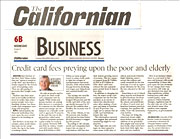Integrity
Matters
October 8, 2003
Credit
card fees preying upon the poor and elderly

 Question: (E-070)
Question: (E-070)
Dear
Jim:
Bob Herbert of the New York Times writes
that our "nation is awash in credit debt"
and describes a family trapped in the vicious cycle of
escalating costs. They are still paying for groceries
they bought years ago.
 Response:
Response:
Unfortunately,
the financial institutions that prey upon the poor would
appear to be breaking no laws.
But
Herbert, in his September 24 column, raises social issues
raised that must not be swept under the rug in the name
of making a buck.
He
tells us people used to be jailed for what credit-card
companies now do legally. While banks and money markets
are paying little interest to consumers, it is common
for the effective annual percentage rate for balances
on a friendly credit card to approach 30 percent. In the
past this was an illegal practice called usury.
Herbert's
statistics present a grim reality for many in our society.
Between 1989 and 2001, he writes, "credit-card debt
nearly tripled from $238 billion to $692 billion as many
people resort to using credit cards to fight the ravages
of unemployment and avoid disaster, while others battle
the gap between declining real wages and rising home and
essential health care costs. The savings rate steadily
declined; bankruptcies jumped 125 percent, and the credit-card
debt of the average family increased by 53 percent. For
middle-class families, the increase was 75 percent. For
senior citizens, it was 149 percent; and, families with
annual incomes below $10,000 increased a staggering 184
percent."
According
the column, credit card companies have leapt gleefully,
into an orgy of exploitation, with late fees the fastest-growing
source of revenue. This fee category jumped from $1.7
billion in 1996 to $7.3 billion in 2002. Most cards have
reduced the late-payment grace period from 14 days to
zero days. In addition to charging late fees, the major
credit-card companies use the first late payment as an
excuse to cancel low, introductory rates, often making
a zero percent card jump to between 22 and 29 percent.
One ought not to assume that all credit-card institutions
behave this way.
The
information reported does suggest that increased monitoring
might be constructive.
Since
high rates are now legal, we must appeal to some sense
of fair play, of ethical and moral behavior. Right thinking
cannot accept this endless and costly treadmill for the
less fortunate. It is not an appropriate dilemma for the
poor, the less educated or the elderly.
Something
is out of whack when shrewd and financially gifted business
decision-makers take advantage of the misery and misfortune
of others. If such cruel and heartless business practices
continue, free markets will suffer. Trust will deteriorate,
even further.
The
hope for living the American dream might seem further
away, and the children of our grandchildren might only
read in history books what could have been their birth
right: freedom and free markets!
Here
is an instance where there is a real need to balance self-interest
with social responsibility. If those who prey upon the
less fortunate do not change their ways, our society will
wake up and demand even more stifling regulations, adding
bureaucracy, with other, unanticipated, consequences.
Unless behavior changes, regulation may be the only way
out of the current abusive mess. Free markets must regulate
themselves, or governments will.